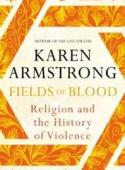
FIELDS OF BLOOD - Karen Armstrong

Countering the atheist claim that believers are by default violent fanatics and religion is the cause of all major wars, Karen Armstrong demonstrates that religious faith is not inherently violent. In fact, the world's major religions have throughout their history displayed ambivalent attitudes towards aggression and warfare. At times they have allied themselves with states and empires for protection or to further their influence; at others they have tried to curb state oppression and aggression and worked for peace and justice. Taking us on a journey from prehistoric times to the present, Karen Armstrong contrasts medieval crusaders and modern-day jihadists with the pacifism of the Buddha and Jesus' vision of a just and peaceful society; moreover, she demonstrates that the underlying reasons - social, economic, political - for war and violence in our history often had very little to do with religion. While human beings have a natural propensity for aggression, collective violence and warfare emerged at a certain point in history when the invention of agriculture created a society and a state based on the accumulation of wealth. For most of history our destructive potential could be contained but with the industrialised warfare and all-powerful state of the modern age, humanity is on the brink of destroying itself. Vast in scope, impeccably researched and passionately argued, Fields of Blood is more than a corrective to the prevailing view that religion is to blame for most of the bloodshed throughout human history: it is a celebration of those religious ideas and movements that have opposed war and aggression and promoted peace and reconciliation.
Sales (May 2014)
UK – The Bodley Head
US – Knopf
Canada – Knopf
Germany – Droemer/Patmos
Holland – Bezige Bij
From the renowned and best-selling author of A History of God, a sweeping exploration of religion and the history of human violence.
For the first time, religious self-identification is on the decline in American. Some analysts have cited as cause a post-9/11perception: that faith in general is a source of aggression, intolerance, and divisiveness—something bad for society. But how accurate is that view? With deep learning and sympathetic understanding, Karen Armstrong sets out to discover the truth about religion and violence in each of the world’s great traditions, taking us on an astonishing journey from prehistoric times to the present.
While many historians have looked at violence in connection with particular religious manifestations (jihad in Islam or Christianity’s Crusades), Armstrong looks at each faith—not only Christianity and Islam, but also Buddhism, Hinduism, Confucianism, Daoism, and Judaism—in its totality over time. As she describes, each arose in an agrarian society with plenty powerful landowners brutalizing peasants while also warring among themselves over land, then the only real source of wealth. In this world, religion was not the discrete and personal matter it would become for us but rather something that permeated all aspects of society. And so it was that agrarian aggression, and the warrior ethos it begot, became bound up with observances of the sacred.
In each tradition, however, a counterbalance to the warrior code also developed. Around sages, prophets, and mystics there grew up communities protesting the injustice and bloodshed endemic to agrarian society, the violence to which religion had become heir. And so by the time the great confessional faiths came of age, all understood themselves as ultimately devoted to peace, equality, and reconciliation, whatever the acts of violence perpetrated in their name.
Industrialization and modernity have ushered in an epoch of spectacular and unexampled violence, although, as Armstrong explains, relatively little of it can be ascribed directly to religion. Nevertheless, she shows us how and in what measure religions, in their relative maturity, came to absorb modern belligerence—and what hope there might be for peace among believers of different creeds in our time.
At a moment of rising geopolitical chaos, the imperative of mutual understanding between nations and faith communities has never been more urgent, the dangers of action based on misunderstanding never greater. Informed by Armstrong’s sweeping erudition and personal commitment to the promotion of compassion, Fields of Blood makes vividly clear that religion is not the problem.
***
MS dostępny
kontakt:
Piotr Wawrzeńczyk
piotr@literatura.com.pl
